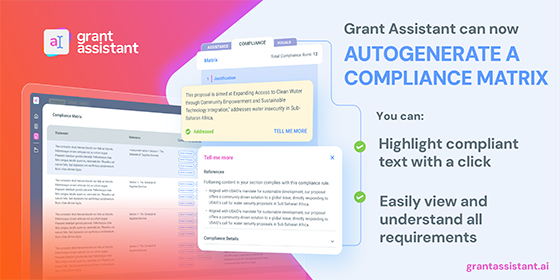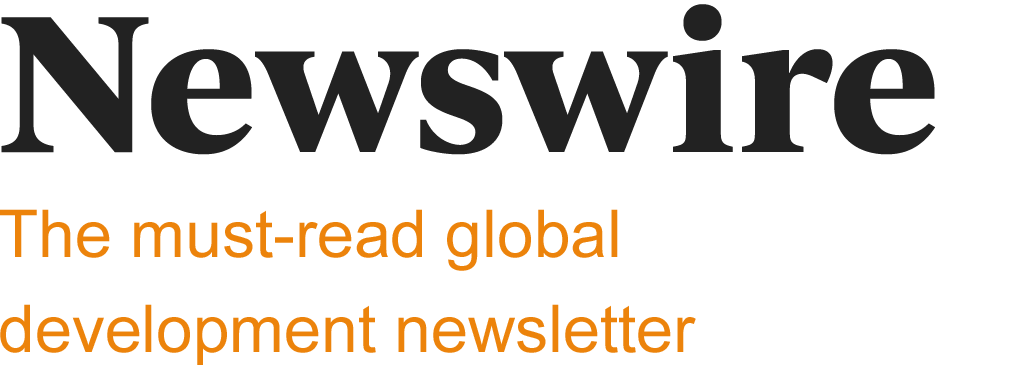|
Are monoclonal antibodies the next frontier in malaria prevention?
|
|
|
|
We analyzed a year's worth of job posting data for roles with USAID. Our data highlights the top regions, countries, and bureaus with the biggest average salaries, showcasing career options at the development agency. Also in today’s edition: We look at malaria prevention, why Africa lags in internet connection, and what’s up next for the Clinton Global Initiative. 
|
|
USAID salary insights
Politics and religion are considered no-nos — or at least risky — topics over dinner; how much someone earns is always a no-no. But today we bring you the lowdown. Want to make a global impact and get paid well for it? USAID might be the place, and we’ve got the salary scoop to prove it! Getting your foot in the door, of course, is another story.
Interest in high-profile international development agencies is always high, as seen by the flood of applicants at the recent USAID Bureau for Management’s hiring fair. In our latest analysis, put together by my colleague Kristiana Louise Ortega, we spotlight salary trends in the development sector, focusing on USAID job data from 748 postings on Devex’s job board over the past year. Obviously, the salaries vary widely depending on location and experience — from an annual salary of $6,163 for a project management assistant in Zambia to $221,900 for a deputy assistant inspector general in the U.S. — and the average salary range is $81,290-$111,055.
Our analysis provides graphs and charts and also delves into the pay scales and grade levels. Check out the report for more details. Read: What we know about job salaries at USAID |
|
A message from Grant Assistant
 Grant Assistant AI transforms the compliance matrix Grant Assistant just got even better with compliance matrix! Transforming a task that typically takes 12 to 15 hours into a matter of seconds. Upload your solicitation, and our AI proposal tool will generate your compliance matrix automatically, highlighting your response to each requirement. See how it works or book a demo. |
|
Plugging Africa’s internet gaps
Poor infrastructure, the high cost of data and devices, limited digital skills, and a lack of digital identification for online transactions stand in the way of improving Africa’s internet coverage, Sophie Edwards writes for Devex.
A new $2.48 billion World Bank program aims to tackle that by extending digital services to more than 180 million people across the east and south of the continent — alongside pioneering plans for the African Continental Free Trade Area to provide a common regulatory framework. However, although it sounds like a decent chunk of cash, that $2.48 billion is spread over eight years, says Alberto Lemma, a digitalization specialist at the ODI think tank. His hope is the money will crowd in other investments. Read: World Bank launches $2.5B program to boost digitalization in Africa |
|
DFC bill clears hurdle
After months of proposals, counter-proposals, and discussions, the bill to extend and adjust the U.S. International Development Finance Corporation’s mandate passed its first hurdle.
Approved by the House Foreign Affairs Committee, the bill would make some key changes: doubling DFC’s investment cap to $120 billion, expanding the countries where it can work, and tackling a long-time unintended accounting issue that limited its ability to make equity investments. The DFC would also gain a license to operate for another seven years, Devex Senior Reporter Adva Saldinger writes. The discussion at a committee hearing was a remarkable show of bipartisanship for the agency, Adva tells me, though some lawmakers are more focused on its foreign policy objectives and role as a tool to counter China than its development mandate. In the end, though, the bill reflects many development advocates’ recommendations — it would strengthen transparency, push DFC to take on more risk, and focus on how well it uses its resources to bring in private capital. It would also allow it to work in high-income countries, sparking worries that this would pull DFC’s focus from the lowest-income nations, which many argue need the funding and support more than their wealthier counterparts. The committee also approved another piece of development legislation we’ve been tracking: the Millennium Challenge Corporation Candidate Country Reform Act, which would expand the number of countries where MCC could work. Read more: House committee approves bill extending, enhancing US DFC Background reading: US Congress looks to expand MCC mandate to include more countries |
|
Sponsored by AstraZeneca
Opinion: Scaling up early detection is vital to reduce lung cancer mortality
Lung cancer remains the leading cause of cancer death, but screening programs could increase the five-year survival rate, on average, by 73%, says AstraZeneca’s vice president for international oncology and market access, Ti Hwei How. |
|
Revolutionizing malaria prevention
Despite significant advances in malaria prevention, nearly half the world's population is still at risk. Nothing seems to keep the buzzing menaces at bay. Enter monoclonal antibodies: Backed by the U.S. National Institutes of Health and the Gates Foundation, they could be game changers in the fight against malaria.
“A monoclonal antibody or long-acting injectable drug that can deliver safe and cost-effective preventive efficacy from a single dose with a long duration of protection would address the limitations [of malaria vaccines],” says Trevor Mundel of the Gates Foundation, describing them as the newest product class for the prevention of malaria. While slow clinical trials, high costs, and low profitability for pharmaceutical companies pose challenges, monoclonal antibodies, which are cloned from individuals exposed to malaria, have shown promising early results in trials and could be the next big thing in malaria prevention, Paul Adepoju writes for Devex. National Institutes of Health’s Neville Kisalu noted their success in protecting adults in Mali, while Gates Medical Research Institute’s Kayla Andrews highlighted their potential to fill gaps left by current vaccines, especially for infants and immune-compromised individuals. Despite financial and logistical hurdles, experts like Ashley Birkett of PATH say the “key challenge is bringing costs down to make them accessible in Africa.” Ongoing research aims to make these antibodies affordable and effective, adding a powerful tool to malaria prevention strategies. “The more effective tools we have to fight malaria, the better,” Andrews says. Read: A new injectable could prevent malaria. What's standing in its way? |
|
CGI: What’s working?
The Clintons today launched their program for the Clinton Global Initiative 2024 annual meeting, focusing on “What's Working!” This year’s event happening on Sept. 23-24, on the sidelines of the U.N. General Assembly in New York, hopes to accelerate successful solutions and emphasize the shared responsibility of citizens to take action.
Speakers at the CGI annual meeting include José Andrés, founder of World Central Kitchen; Pfizer CEO Albert Bourla; Tedros Adhanom Ghebreyesus, head of the World Health Organization; primatologist and anthropologist Jane Goodall; Michelle Nunn, CEO of CARE; Peter Laugharn, CEO of the Hilton Foundation; Michael S. Regan, administrator of the U.S. Environmental Protection Agency; and John-Arne Røttingen, CEO of Wellcome. Almost 20 years after CGI’s launch, former U.S. President Bill Clinton, former Secretary of State Hillary Rodham Clinton, and Clinton Foundation Vice Chair Chelsea Clinton now lead an organization that has facilitated more than 4,000 “commitments to action” and mobilized billions of dollars that have helped more than 500 million people worldwide. “The CGI community has shown that we all have the potential to make a difference on the biggest global challenges — if we cooperate and work with a commitment to action,” former President Clinton said, adding that the initiative will look at “the most promising solutions to these challenges, the best ways to bring these ideas to scale, and the speed with which we can get them to work.” CGI’s philanthropy drives action in five areas: building resilient communities against climate change; achieving economic security; fostering health equity; mobilizing resources for humanitarian crises; and advancing equality for women and girls in health, economic power, climate change, education, empowerment, and combating gender-based violence. |
|
sponsored announcement
Advancing women-led MSMEs through digital financial inclusion
Women-led MSMEs’ economic power starts with digital financial inclusion. Yet, barriers persist, hindering access to financial services. The amount of research on unlocking their true potential is overwhelming, which is why the Women’s Digital Financial Inclusion Advocacy Hub, representing 82 organizations worldwide, created one holistic resource. Explore nine enablers with examples of how policies, digital financial products, and grassroots actions fuel women entrepreneurs’ resilience and growth. |
|
In other news
The Biden administration proposed new standards requiring the hospital industry to invest billions in maternity care improvements as part of its latest election-year initiative on women's health. [Axios] Burkina Faso’s military junta has adopted a draft law that will criminalize homosexuality. [Reuters] The head of the U.N. migration agency, Amy Pope, announced that IOM has secured hundreds of millions of dollars in new funding and diversified its donor base, amid concerns over future aid support. [AP News] 
|
|
Thank you for reading today’s Newswire, edited by Rumbi Chakamba, copy edited by Nicole Tablizo, and produced by Patricia Esguerra. Have a news tip? Email [email protected].
Forwarded by a friend?
Sign up here to receive the Newswire directly.
|
|
Devex thanks our partners for supporting our newsletters.
Our editorial content remains independent. Interested in partnering with us? Get in touch. |
|
Connect with us:
|





